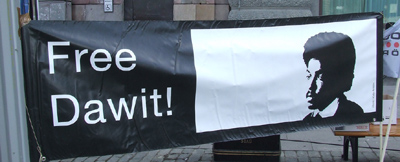Journalist Dawit Isaac has spent 3,127 days in government custody in his native Eritrea, according to the ticker on FreeDawit, a Web site based in Sweden, Isaac’s adopted country, where he is a citizen. He has never been publicly charged with a crime or been given a trial. A thorny issue between Sweden and the Red Sea nation for many years, the imprisonment of Isaac sparked disagreement between diplomats for the two countries again this week.
The dispute was sparked by Swedish media reports quoting European Union parliamentarian Eva-Britt Svensson as saying that Eritrea’s ambassador in Brussels, Girma Asmerom Tesfay, had promised that his government would formally charge Isaac and take him to court. “During our conversation, he said suddenly, that Dawit Isaac will have a trial,” Svensson told Expressen newspaper. But Negassi Kassa Tekle, deputy chief of the Eritrean Mission in Brussels, described the statement as being much narrower: “The ambassador said only that all Eritreans have the right to be tried. We have no new information about Dawit Isaac.” Still, Svensson is standing by her recollection. “I have my notes and my recollection that he had not talked in general. He spoke very precisely. It was ‘Dawit Isaac has to have a trial,’” Expressen reported.
Diplomatic recollections aside, friends and family of Isaac received the news with deep skepticism. Isaac’s brother Esayas told CPJ that earlier Eritrean promises of due process were never fulfilled. “We still don’t know why he’s in prison,” he said. “Eight years is enough for us; it’s definitely enough for Dawit.” Leif Öbrink, a close friend of Isaac and the president of a coalition of local and international organizations that delivers a petition to the Eritrean embassy in Stockholm every Tuesday, offered similar sentiments. “From experience, as long as the [Eritrean] president doesn’t say it, it’s not believable,” he told me. Öbrink was one of two people Isaac phoned in November 2005 when authorities briefly released him—only to return him to prison days later.
Speaking to Expressen, Tekle, the Eritrean diplomat, said the ambassador was following standard Eritrean government talking points. “The ambassador replied in accordance with standard procedure. He said he guarantees that no one in Eritrea is convicted without having had a trial. He talked about the matter in context, that Eritrea is a country that respects international law. It is the same information we give to everyone else,” he said.
Tekle’s assertions notwithstanding, neither Isaac nor the 18 other journalists being held in Eritrea have been publicly charged or brought to trial. Many were first detained in 2001, when the government cracked down on political dissent and the independent media. Authorities have consistently refused to say what crimes Isaac or the other journalists allegedly committed, where they are being held, and, in some cases, whether they are even alive.
Ironically, the talking points Tekle referenced reflect legal guarantees contained in Eritrea’s constitution—a document President Isaias Afeworki indefinitely suspended in September 2001 after shutting down private newspapers like Isaac’s Setit, which had published columns demanding its implementation during a divisive national debate on the direction of Africa’s youngest nation. In a June 2009 TV interview, Afeworki declared that Isaac had made a “mistake,” and would be “dealt with” outside the Eritrean court system.
Eritrea is among the small number of states worldwide that have detained journalists for prolonged periods without charge or trial. (Those nations have also included the United States and Iran). Supporters of Isaac and the other journalists say Eritrean authorities, by holding the detainees incommunicado, are effectively engaged in enforced disappearance. According to the International Convention for the Protection of All Persons from Enforced Disappearance, enforced disappearance is “the arrest, detention, abduction or any other form of deprivation of liberty by agents of the state […] followed by a refusal to acknowledge the deprivation of liberty or by concealment of the fate or whereabouts of the disappeared person, which place such a person outside the protection of the law.” Eritrean officials have repeatedly refused to provide CPJ or anyone else with the whereabouts, legal status, or health of the journalists being held in Eritrea.
“Authorities have not presented a single piece of concrete evidence against those accused,” said Semere Kesete, an Eritrean lawyer who disappeared in government custody for nearly a year after being detained without charge in 2001. Kesete, who escaped after months in solitary confinement, is now producing a Tigrigna-language film in which the detainees are given a fictionalized day in court. “It’s up to the government to produce clear evidence of whatever crimes may have been committed. By putting people in undisclosed places, you cannot bring justice.”
